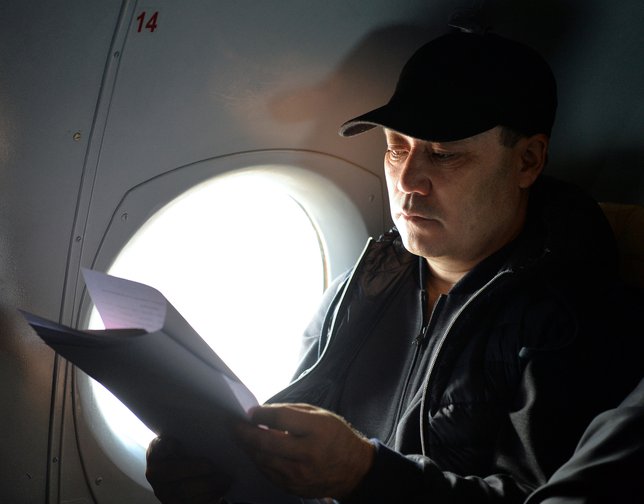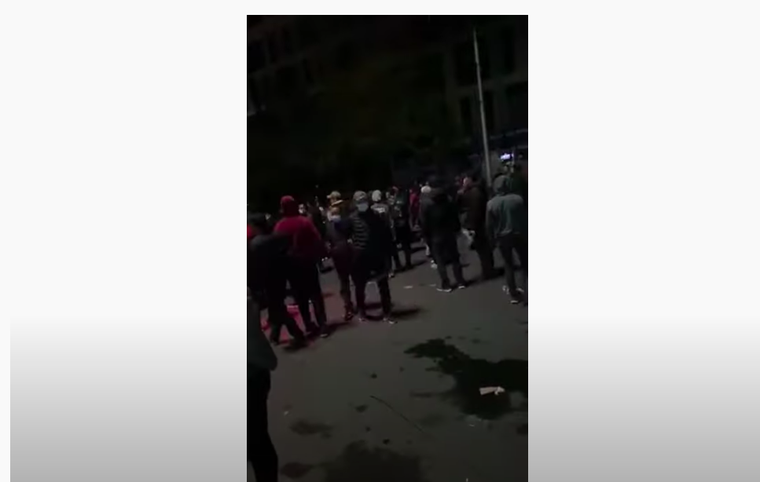“Japarov is our Trump”: why Kyrgyzstan is the future of global politics
This weekend, Kyrgyzstan goes to the polls in a high-stakes joint election and referendum that will decide the future of democracy in the country.

“Japarov’s our Trump”, a friend quipped as we discussed the current political situation at a crowded queer party in Bishkek, the country’s capital. This comparison between Sadyr Japarov - the former-convict-turned interim PM and president of Kyrgyzstan - and the outgoing billionaire president of the US may strike some as an exaggeration. But it allows us to approach the political turmoil that followed Kyrgyzstan’s October 2020 parliamentary elections in the frame of global political trends, rather than tired narratives of clans, the country’s north-south divide or the allegedly “nomadic mentality” often employed to make sense of Kyrgyz politics.
In a recently published book to mark the 150 anniversary of Vladimir Lenin’s birth, French philosopher Alain Badiou - one of the contributors, along with yours truly - refers to the Bolshevik leader as “the founder of the modern meaning of the word ‘politics’”. Badiou suggests that it was Lenin who formulated our understanding of politics as a confrontational and antagonistic articulation of radically transformative political demands. In other words, Lenin shifted our perception of politics from the technocratic process of managing public affairs, to the conflictual discussion of politics itself. Paradoxically, in our neoliberal era, it is the far right that has become the most outspoken proponent across the globe of this Leninist idea of politics as uncompromising and confrontational.
This definitely applies to Sadyr Japarov, whose deliberate anti-establishment appeal and nationalist populist rhetoric on their own make the comparison with Trump legitimate in the context of Kyrgyzstan. It has become commonplace among political analysts to characterise the latest Kyrgyz parliament as one of the most incompetent since independence, given the unprecedented number of oligarchs and their associates sitting in the legislative body. In the aftermath of October’s election, Japarov skilfully manipulated people’s rage against the political elites largely associated with a parliament marred by corruption and scandals. His criminal record and extravagant political behaviour only intensified his anti-establishment appeal, shrouding him in the aura of a political martyr.
Crucially, Japarov seems to share with Trump and other right-wing populists a similar understanding of politics as confrontation. Most commentators and politicians have refrained from calling the protests against the rigged parliamentary elections in October - which eventually led to the ousting of president Sooronbai Jeenbekov - a revolution. Yet the constitutional reform Japarov is now pushing for is nothing less than a revolutionary attempt to rewrite the existing social contract. At its core, this reform, if implemented, would mark the end of arguably the only democratic achievement of Kyrgyzstan’s 2010 April revolution - parliamentarism - in exchange for a return to the presidential form of government.

Japarov and his allies have been branding a strong presidentialism as the only remedy against Kyrgyzstan’s corrupt and incompetent 120-member parliament. On top of it, other radical suggestions are being publicly voiced, including the removal of Russian’s official status - a problematic move much-supported by Kyrgyz nationalists, despite the widespread use of the language especially in cities - and even the removal of “secular state” from the list of constitutional characteristics that define the Kyrgyz Republic. Despite vocal opposition to these reforms from liberal segments of Kyrgyz society, the proposed changes appear to enjoy widespread support among the populace.
This drive to radically redefine Kyrgyzstan’s social contract is one of the key elements of right-wing populism worldwide. Charismatic nationalists are not afraid to go against what is believed to be the prevailing common sense, literally putting the revolutionary motto of 1968 (“Be realistic, demand the impossible”) into practice. Unsurprisingly, their demands for a revival of national pride (and the promotion of authoritarian means to achieve it) find wide support in societies that crave change. This is certainly Japarov’s case, whose mass popularity came as a surprise not only to the generally apolitical Russophone residents of Bishkek, but also to the experienced Kyrgyz politicians who failed to oppose Japarov and his supporters’ energy and assertiveness in any meaningful way. That is, until it was too late.
Across the political spectrum, anti-establishment sentiment was a driving force behind the October protests. However, as the protest wave grew, the principal differences between the different factions became more apparent. While on the streets Japarov and thousands of his supporters demanded immediate changes to the existing political order, opposition politicians called for a “return to legitimacy and normality”. The contrast between pro- and anti-Japarov rallies in Bishkek later in October could not have been more striking.
Many commentators, including politicians, delighted in counterposing the opposition’s “cultured and intelligent” participants to the “uneducated and drunk” mobs supporting Japarov, describing their difference in cultural terms. Similarly to trends elsewhere in the world, however, nationalist populist charisma finds its strongest appeal among the disenfranchised strata of society, namely the impoverished working class hailing from provincial towns and rural areas.
Indeed, opposition rallies in Bishkek gathered primarily young urbanites with creative mottos and posters, while Japarov’s supporters travelled to the capital from the regions. So it is misleading to frame the split between anti- and pro-Japarov supporters in only cultural terms, as their main difference is political. Calls for a return to legitimacy necessarily originate from radically different understandings of politics than demands to demolish the status quo. The former views politics as a process of control and management of the state apparatus; the latter places confrontation at the core of the political process.
Again, this has become a distinctive feature of right-wing populists who have appropriated Lenin’s original radical drive for a politics of confrontation, though imbued with a totally different political content. Perhaps some still remember that, in 2016, the notorious right-wing ideologue and Trump’s chief-of-staff Steve Bannon described himself as a “Leninist”. He was only half-joking. As Bannon himself explained, he pursued the same political goal as the Bolshevik leader: “I want to bring everything crashing down, and destroy all of today’s establishment.”
Mobilisation in favour of nationalist, religious and moral sentiments - the core of the right-wing political project - is perceived as the only alternative to the miseries of globalised neoliberal capitalism
Most liberal and centrist commentators interpreted this self-proclamation in tactical terms, drawing parallels between authoritarian tendencies, aggressive propaganda and political censorship common to the Bolsheviks and Bannon/Trump politics.
What they missed is the fundamentally strategic core of Bannon’s declaration: far-right populists take from Lenin not his tactics but his understanding of politics as confrontation rather than consensus. This antagonistic drive finds popular support because it emanates energy and hope, albeit illusionary. In the absence of a viable progressive agenda focused on solidarity and social justice, mobilisation in favour of nationalist, religious and moral sentiments - the core of the right-wing political project - is perceived as the only alternative to the miseries of globalised neoliberal capitalism, which have only intensified amid the current COVID-19 pandemic.
Japarov’s staggering political success is informed by this global trend at least as much as it is by the intricacies and peculiarities of the Kyrgyz local political landscape. In this respect, he is indeed “our Trump”. But the concentration of power in the hands of an authoritarian nationalist within corrupt or non-existent democratic institutions offers little promise of a brighter future for Kyrgyzstan. The only hope is that this illiberal retrenchment becomes a wake-up call for progressive forces in Kyrgyz society to formulate a viable alternative to Japarov and his so far unchallenged populist appeal. Whether that happens or not, only time can tell.

No comments:
Post a Comment
Note: only a member of this blog may post a comment.